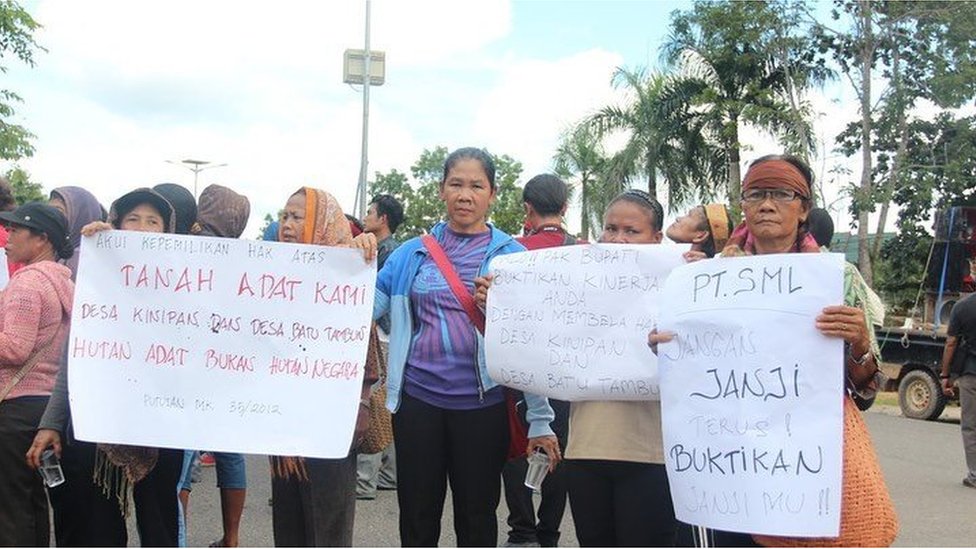


Indonesia is a mega-biodiverse country with extraordinary natural wealth and biodiversity, much of which is located in customary territories. According to data from the Customary Territory Registration Agency (BRWA), more than 21 million hectares of customary territories have been mapped, but only a small portion is legally recognized by the state. Within the framework of national development, indigenous communities are often vulnerable due to weak legal protection of their customary rights. Cases of agrarian conflict, land grabbing, and even criminalization are often experienced by indigenous communities as they defend their traditionally managed territories from corporate expansion, particularly in the plantation and mining sectors. One of the most high-profile cases in recent years is the Laman Kinipan case in Lamandau Regency, Central Kalimantan. This community is fighting for recognition of their customary territory, which had been unilaterally granted as a concession to the palm oil company PT Sawit Mandiri Lestari (SML). The conflict between the Laman Kinipan indigenous community and the palm oil company began when the local government granted a location permit to PT SML in 2018, covering a forest area claimed as part of the Kinipan customary territory. The indigenous community stated that they never gave their consent to the land transfer, and that they had long been conducting participatory mapping of their customary territories, which should have been the basis for official recognition from the local government. However, instead of recognition, they were criminalized. In August 2020, Kinipan customary leader Effendi Buhing was arrested by police on charges of stealing company-owned heavy equipment, after previously actively speaking out against palm oil expansion. The arrest sparked widespread protests from civil society and human rights activists, as it was deemed to have violated legal procedures and was fraught with political and economic interests. The handling of the Kinipan case exposed the weak legal protection for indigenous communities in Indonesia, largely stemming from the stalled ratification of the Indigenous Peoples Bill. This bill was proposed for over a decade, and despite being included in the National Legislation Program (Prolegnas) several times, it has yet to be passed. The Indigenous Peoples Bill should serve as the legal basis for: ● Recognition and protection of customary land, forest, and natural resource rights. ● A mechanism for resolving conflicts between indigenous communities and outsiders. ● Establishment of customary institutions recognized by the state. ● Strengthening the principle of Free, Prior, and Informed Consent (FPIC) as a standard for decision-making. The absence of this law results in violations of the principles in: ● Article 18B paragraph (2) of the 1945 Constitution: The state recognizes and respects the unity of customary law communities and their rights. ● Law No. 39 of 1999 concerning Human Rights, especially the right to land, a good environment, and the right not to be criminalized. ● Constitutional Court Decision No. 35/PUU-X/2012: States that “customary forests are no longer state forests.” Expert View According to Dr. Rina Mutia Sari, an expert on forestry and indigenous peoples policy (2022), the stagnation of the ratification of this bill shows that “the state is more in favor of extractive economic interests than environmental sustainability and social justice.” A similar view was expressed by Abdon Nababan, an indigenous community leader, who stated that "indigenous communities are always victims of development because they are not recognized as full legal subjects." On the other hand, according to Prof. Hariadi Kartodihardjo (IPB), natural resource management policies in Indonesia tend to be exploitative and non-inclusive, because they ignore traditional management systems that have been proven to maintain long-term ecosystem sustainability. Policy recommendations from a scientific perspective: 1. Immediately pass the Indigenous Peoples Law Bill to eliminate the legal vacuum that is the root of conflict. 2. Implement a moratorium on business permits in areas currently in dispute with indigenous communities, until there is legal clarity. 3. Strengthen indigenous peoples' participation in natural resource governance, in accordance with the principles of ecological justice. 4. Strictly implement FPIC, as a form of protection from land grabbing. 5. Review permits that overlap with indigenous territories through socio-environmental audits and participatory mapping. Conclusion The Laman Kinipan case is not an isolated case, but rather a reflection of the structural conflict between the extractive development model and indigenous peoples' rights to their living space and ecology. As a Master of Natural Resources, I see that the delay in ratifying the Indigenous Peoples Bill not only violates the constitutional rights of indigenous peoples, but also exacerbates environmental degradation, social conflict, and creates power imbalances in natural resource management. It is time for the state to prioritize inclusive sustainability, not just expansive growth.